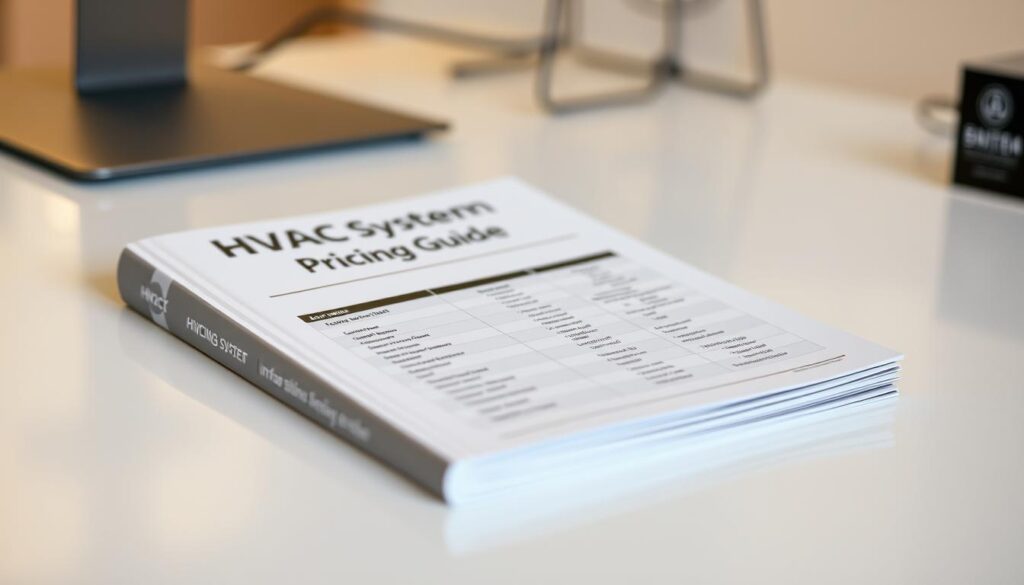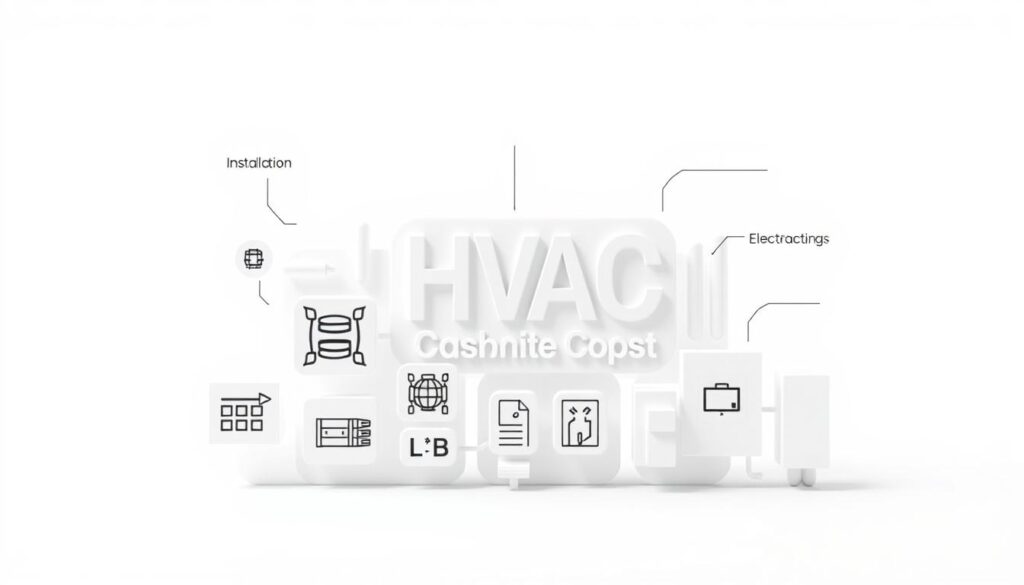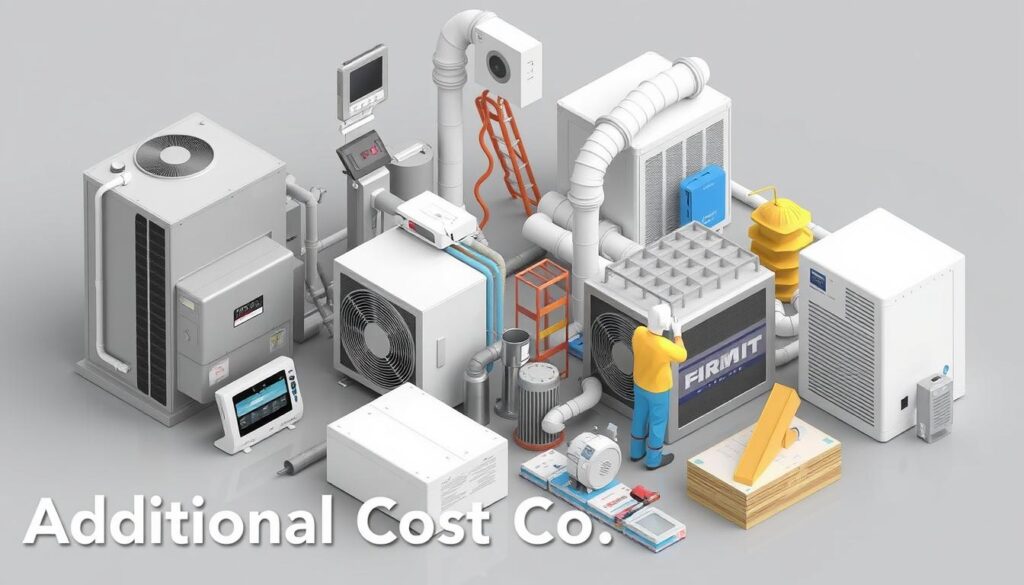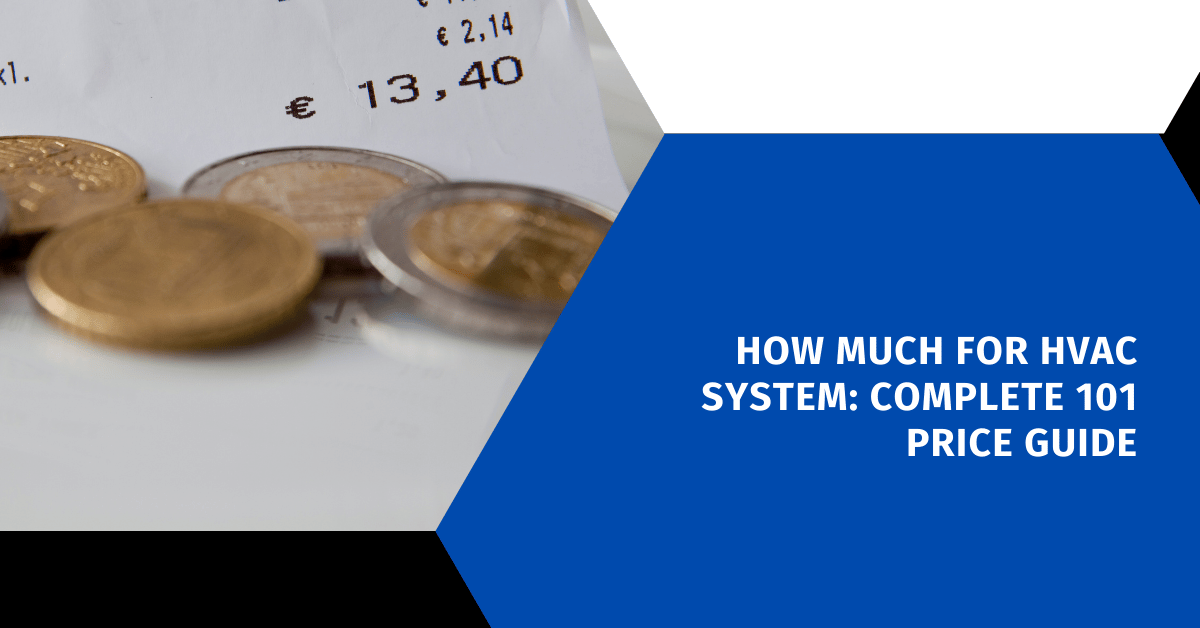Affiliate Disclosure
HVAC Guide Guys is a participant in the Amazon Services LLC Associates Program, an affiliate advertising program designed to provide a means for sites to earn advertising fees by advertising and linking to Amazon.
How Much for HVAC System? Ever wondered why HVAC system pricing can feel like solving a complex puzzle? It’s not just about money. It’s about making your home comfortable and efficient.

Homeowners face many options when looking at HVAC system pricing. A basic air conditioner and furnace for a small home costs between $10,000 and $15,000. But, bigger homes with top-notch equipment can cost over $20,000.
Your choice depends on several things. These include the system type, your home’s size, and how energy-efficient it is. This guide will help you understand HVAC system pricing. It aims to help you choose wisely, balancing comfort and cost.
Key Takeaways
- Average HVAC installation costs range from $10,000 to $15,000
- Home size significantly impacts overall HVAC system pricing
- Energy efficiency ratings influence total system cost
- Different HVAC system types have varying price points
- Professional installation is key for the best performance
Table of Contents
Understanding HVAC System Basics
When looking at residential hvac costs, knowing the basics is key. Your home’s comfort comes from a network of equipment. This network controls temperature, humidity, and air quality.
Modern HVAC systems are a big investment. They are complex machines that work together. They keep your home at the perfect temperature.
Core Components of an HVAC System
- Furnace: Generates heated air for winter months
- Air Conditioner: Produces cooled air during summer
- Thermostat: Controls temperature settings
- Ductwork: Distributes conditioned air throughout home
- Air Handler: Circulates air through the system
Types of HVAC Systems
Homeowners have many choices for HVAC systems:
- Central Air Systems: Traditional cooling and heating
- Heat Pumps: Dual-function heating and cooling
- Ductless Mini-Splits: Flexible zone-based temperature control
Importance of Proper HVAC Sizing
Choosing the right-sized HVAC system is vital. A system that’s too small can’t keep your home comfortable. On the other hand, a system that’s too big wastes energy and raises costs.
Proper sizing ensures maximum efficiency and long-term performance.
Professional HVAC technicians can find the perfect size for your home. They consider your home’s size, insulation, and comfort needs.
Explore Our HVAC Shop
Looking for top-rated HVAC tools, parts, and accessories? Visit our shop and find the perfect solution for your needs.
Visit the ShopHow Much for HVAC System: Breaking Down the Costs
Understanding hvac unit prices can feel overwhelming. Your HVAC system is a big investment for your home. Costs vary widely based on several factors. When looking into hvac system installation costs, consider a few key things.
The main cost factors for HVAC systems include:
- Equipment type
- System efficiency rating
- Home square footage
- Installation complexity
- Regional labor rates
Let’s look at the typical price ranges for different HVAC equipment types:
| HVAC Equipment Type | Average Price Range | Installation Complexity |
|---|---|---|
| Central Air Conditioner | $3,000 – $7,000 | Moderate |
| Heat Pump System | $4,000 – $8,500 | High |
| Gas Furnace | $2,500 – $6,000 | Low to Moderate |
Your actual hvac unit prices might differ based on specific home requirements. Professional assessment remains critical for accurate pricing. Investing in an energy-efficient system can save you money on utility bills in the long run.
Ductwork installation can add $2,000 to $5,000 to your total cost. This depends on your home’s size and existing infrastructure.
Average HVAC Installation Costs by System Type
Choosing the right HVAC system depends on many factors. These include your home’s size, the local climate, and your budget. Knowing the costs of different systems helps you make a smart choice and control your expenses.
When looking at hvac contractor rates, you’ll find several main system types. Each has its own price and performance:
Central AC and Gas Furnace Costs
The classic home heating and cooling solution costs between $6,500 and $14,500. This system includes:
- Central air conditioning unit: $3,500–$8,500
- Gas furnace: $3,000–$6,500
- Installation labor: $1,000–$3,000
Heat Pump System Pricing
Heat pumps are great for both heating and cooling. They cost $4,000 to $10,000 to install. They’re very efficient in mild climates.
Ductless Mini-Split Costs
Ductless mini-split systems are perfect for controlling temperature in specific areas. They cost about $1,500–$4,000 per unit. They’re best for homes without ductwork or for heating and cooling certain rooms.
Pro tip: Always get multiple quotes from certified HVAC contractors to ensure competitive pricing and quality installation.
HVAC Replacement Cost Factors
Deciding whether to repair or replace your HVAC system can be tough. The cost to replace your HVAC depends on several key factors. These factors can greatly affect your total investment.
Age is a big factor in deciding to replace your HVAC. Systems over 10-15 years old often lose efficiency and break down more. If repair costs get close to half the price of a new system, it’s better to replace.
- Systems older than 15 years typically require replacement
- Frequent repairs indicate a system failure is likely
- Rising energy bills show your system is not working well
Your hvac labor costs will vary based on several important factors:
- How complex your current system is
- The size of your home
- The state of your ductwork
- Local installation rates
Pro tip: While the initial cost of replacement might seem high, a new system can save you a lot on your monthly bills.
Signs you need a new HVAC include constant heating or cooling problems, strange noises, uneven temperatures, and lots of dust. Getting a modern HVAC system improves your comfort and can cut energy use by 20-40%.
A smart HVAC replacement can boost your home’s value and comfort while lowering energy costs over time.
Explore Our HVAC Shop
Looking for top-rated HVAC tools, parts, and accessories? Visit our shop and find the perfect solution for your needs.
Visit the ShopHVAC Equipment Pricing by Home Size
Your home’s size is key in figuring out HVAC costs. The size of your home affects the HVAC system you need. This includes both heating and cooling.
HVAC prices change a lot based on your home’s area. Bigger homes need stronger, more complex systems. This makes the cost go up.
Small Homes (1,000-2,000 sq ft)
- Average HVAC system cost range: $3,000 – $5,500
- Typically require smaller, less powerful units
- Lower installation complexity
- Ideal for compact living spaces
Medium Homes (2,100-3,000 sq ft)
- Average HVAC system cost range: $5,500 – $8,000
- Need more robust heating and cooling capacity
- Increased ductwork and installation requirements
- More sophisticated temperature management
Large Homes (3,100+ sq ft)
- Average HVAC system cost range: $8,000 – $12,000
- Require high-capacity, multi-zone systems
- Complex installation with extensive ductwork
- Advanced climate control technologies
Keep in mind, these prices are just estimates. Your actual HVAC costs can change. This is due to things like local labor rates, system efficiency, and your home’s setup.
Labor and Installation Costs

When planning your HVAC system installation, knowing about hvac labor costs is key. HVAC contractor rates usually fall between $75 and $150 per hour. This can change based on where you live and how complex your project is.
The cost of labor for an HVAC installation can vary a lot. This depends on several important factors:
- Complexity of the system being installed
- Local market rates
- Technician’s experience level
- Required permits and inspections
In cities, hvac contractor rates tend to be higher. This is because living costs are higher and there’s more demand for skilled workers. A typical residential HVAC installation can take 8-12 hours. This means labor costs could be 30-50% of your total project cost.
Different HVAC systems also affect labor costs:
- Central Air Conditioning: More complex installation
- Heat Pumps: Moderate labor requirements
- Ductless Mini-Splits: Generally quicker installation
Always ask for detailed quotes from several HVAC professionals. This will help you understand the specific labor costs for your home’s needs.
Energy Efficiency and SEER Ratings Impact on Price
When looking at hvac equipment costs, knowing about energy efficiency is key. The Seasonal Energy Efficiency Ratio (SEER) is important for hvac unit prices and long-term costs.
There are different levels of energy efficiency in HVAC systems. Each level has its own price and performance. Your choice affects both the cost now and energy savings later.
Standard Efficiency Systems
Standard efficiency HVAC systems usually have:
- Lower initial purchase prices
- SEER ratings between 13-15
- Basic energy performance
- Moderate operational costs
High-Efficiency Systems
High-efficiency models offer better performance with:
- SEER ratings between 16-20
- Less energy use
- A bit higher price
- Better comfort
Premium ENERGY STAR Models
“Investing in premium efficiency can save up to 30% on cooling costs annually” – ENERGY STAR Research
Premium ENERGY STAR certified HVAC units are the top in energy efficiency. They have:
- SEER ratings 20 and above
- Higher upfront hvac equipment costs
- Big savings on energy over time
- Latest technology features
Remember, while premium systems cost more at first, they can greatly cut your yearly energy bills.
Explore Our HVAC Shop
Looking for top-rated HVAC tools, parts, and accessories? Visit our shop and find the perfect solution for your needs.
Visit the ShopAdditional Cost Considerations

When planning for an HVAC system, remember there’s more than the initial cost. Several hidden expenses can greatly affect your total investment in a new heating and cooling setup.
Local laws often demand specific permits for HVAC installation. These permits usually cost between $250 to $400, based on your area. Skipping this can lead to fines or removal of your system.
- Permit costs: $250-$400
- Electrical system upgrades
- Home insulation improvements
- Ductwork modifications
Your HVAC installation cost might go up due to needed home prep. Older homes might need extra work for a new system:
- Electrical panel upgrades
- Ductwork sealing or replacement
- Insulation enhancements
Pro tip: Always get a detailed assessment from a professional HVAC contractor to understand possible extra costs before starting your project.
Unexpected costs can add 10-20% to your total HVAC system pricing, so plan your budget carefully.
Some homeowners might need to spend on structural changes or energy efficiency upgrades for their new HVAC system. These steps ensure the system works well and can lower energy costs over time.
HVAC Brands and Their Price Ranges
Choosing the right HVAC brand is key to your hvac unit prices and equipment costs. Knowing the price ranges and quality levels helps you choose wisely for your home’s comfort.
HVAC makers fall into three main price tiers. These tiers show their quality, performance, and reliability.
Budget-Friendly Brands
For those watching hvac costs, budget brands are a good choice. They offer basic features at lower prices:
- Goodman: Known for cost-effective systems
- Coleman: Offers reliable entry-level equipment
- Payne: Provides simple, affordable HVAC solutions
Mid-Range Options
Mid-range brands offer a mix of performance and price. They give dependable HVAC systems at moderate costs:
- Rheem: Solid performance with reasonable costs
- Bryant: Consistent quality at moderate prices
- Lennox: Balanced pricing with good efficiency
Premium Manufacturers
Premium brands have top technology, advanced features, and durability:
- Carrier: Industry-leading innovation
- Trane: Exceptional build quality
- Daikin: Advanced energy-efficient systems
When choosing a brand, think about your budget, home size, climate, and what you expect in the long run.
| Brand Category | Price Range | Average Lifespan |
|---|---|---|
| Budget Brands | $2,000 – $4,500 | 10-15 years |
| Mid-Range Brands | $4,500 – $8,000 | 15-20 years |
| Premium Brands | $8,000 – $15,000 | 20-25 years |
Explore Our HVAC Shop
Looking for top-rated HVAC tools, parts, and accessories? Visit our shop and find the perfect solution for your needs.
Visit the ShopSeasonal Price Variations and Best Time to Buy
Knowing when to buy can save you money on HVAC systems. The time you choose to buy can greatly affect the cost.
Peak seasons, like summer and winter, raise HVAC prices. Demand is high, and contractors are busy. This leads to:
- Higher labor rates
- Limited availability
- Potential rush fees
Smart homeowners plan their HVAC purchases for off-peak seasons. The best times to buy and install are spring and fall. You’ll find:
- Lower labor costs
- More competitive pricing
- Greater contractor availability
Manufacturers offer deals in slow periods. By planning and installing during these times, you could save 10-20% on costs.
Pro tip: Start researching and getting quotes in early spring or late autumn to save more.
Strategic planning can greatly reduce your HVAC costs.
Conclusion
Figuring out the cost of an HVAC system installation needs careful thought and planning. It’s not just about the upfront cost. It also includes long-term energy savings and comfort in your home. Smart homeowners know that the cost depends on the system type, home size, and how well it performs.
When looking at HVAC options, getting several quotes is key. Each installation offers a chance to balance the initial cost with long-term energy savings. Brands like Carrier, Lennox, and Trane have different solutions that fit your budget and needs.
Your choice should consider both the immediate cost and future energy savings. Look into local rebates, energy incentives, and professional installation services. This way, you’ll get a comfortable home while keeping costs down over time.
Getting help from certified HVAC pros can make a big difference. They know the local climate and can suggest systems that fit your home perfectly. Your hard work will lead to a reliable and efficient heating and cooling system for your home.

